Rift Valley Fever Symptoms - Texas A&M University College of
advertisement
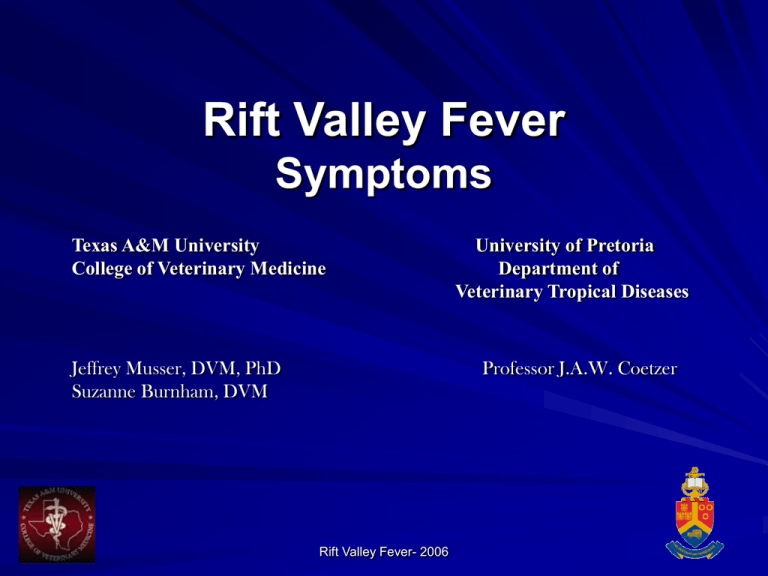
Rift Valley Fever Symptoms Texas A&M University College of Veterinary Medicine Jeffrey Musser, DVM, PhD Suzanne Burnham, DVM University of Pretoria Department of Veterinary Tropical Diseases Professor J.A.W. Coetzer Rift Valley Fever- 2006 Special thanks for materials borrowed with permission from presentations by: Dr Linda Logan, “Rift Valley Fever” CSU Foreign Animal Disease Training Course, College of Veterinary Medicine and Biomedical Sciences, August 1-5, 2005. Professor JAW Coetzer, Department of Veterinary Tropical Diseases, Faculty of Veterinary Science, University of Pretoria, “Rift Valley Fever” presented at the FEAD course in Knoxville, Tenn. 2005. Rift Valley Fever- 2006 Rift Valley Fever In this presentation the authors especially drew from the first hand experience of their colleagues in South Africa. Personal interviews as well as standard research sources provide the insights we bring you for the recognition of this exotic disease. JAW Coetzer Jeffrey Musser Suzanne Burnham Rift Valley Fever- 2006 Rift Valley Fever Rift Valley Fever (RVF) is an arthropod-borne, acute, fever-causing viral disease of sheep, goats, cattle and people. Rift Valley Fever- 2006 Rift Valley fever in Africa causes abortions in sheep, cattle and goats high mortalities in lambs and kids and generalized disease in man. Rift Valley Fever- 2006 Rift Valley Fever RVF was first observed when European stocks of domestic animals were introduced to Africa. These species are more severely affected than native African stock. Rift Valley Fever- 2006 Host Range Mainly a disease of sheep Rift Valley Fever- 2006 Host Range In Sheep Mortality in lambs under 2 weeks of age approaches 100% Mortality in older sheep reaches 30% with abortions approaching 100% Rift Valley Fever- 2006 Host range Cattle are less susceptible than sheep, some are subclinical; mortality averages 5% with some abortions Rift Valley Fever- 2006 Host Range Goats Buffalo Rift Valley Fever- 2006 Host Range Domestic dogs and cats – susceptible but usually only have asymptomatic viremia Swine - resistant Birds - refractory, no virus isolation Rift Valley Fever- 2006 Host Range Horses – have viremia but are resistant Rift Valley Fever- 2006 Host range - wildlife Springbok African Buffalo Camels (in Egypt) Water buffalo in Egypt Rift Valley Fever- 2006 Host range - wildlife Water buffalo - up to 50% abortion rate Rift Valley Fever- 2006 Host range - wildlife Camels (in Egypt) - inapparent disease except abortions Rift Valley Fever- 2006 Rift Valley fever host range and disease severity Mortality ~100% Severe Illness Abortion, Low Mortality Severe Illness Viremia Abortion Infection Viremia Lambs Sheep Monkeys Horses Cattle Camels Cats Goats Rats Dogs Gray squirrels Monkeys Calves Kids Puppies Kittens Water buffalo White mice Guinea pigs Rabbits Pigs Hedgehogs Tortoises Frogs Chickens Hamster Field mice Refractive to infection Canaries Pigeons Humans Door mice Parakeets Field voles Rift Valley Fever- 2006 Incubation period 1-6 days 12-36 hours in lambs; will be dead before they can acquire passive immunity Rift Valley Fever- 2006 Clinical signs Sheep and Goats Incubation period less than 3 days High rate of abortion at any stage of gestation Some show no symptoms Rift Valley Fever- 2006 In pregnant ewes, abortion may approach 100% Aborted fetus is usually autolyzed. Rift Valley Fever- 2006 Clinical signs Sheep and Goats Abortion rate in sheep from 40 – 100% Ewe may also retain the placenta Endometritis is another complication after aborting the fetus USDA Rift Valley Fever- 2006 Clinical signs Sheep and Goats Early signs o Fever 40-41°C o Loss of appetite o Jaundice o Weakness Rift Valley Fever- 2006 Clinical signs Sheep and Goats Encrustation around the muzzle from bloody nasal discharge Rift Valley Fever- 2006 Clinical signs Sheep and Goats Some develop diarrhea Rift Valley Fever- 2006 Clinical signs Sheep and Goats Acute death may occur in 20-30% of adults Rift Valley Fever- 2006 Clinical signs Sheep and Goats Heavy sheep losses occur during epidemic Rift Valley Fever- 2006 Clinical Signs in lambs and kids Newborn Lambs, Kids: Most severe in young lambs under 2wks old (mortality has high as 90%) – fever (40-42°C), – anorexia, – weakness, Rift Valley Fever- 2006 Clinical Signs in lambs and kids Lambs seem reluctant to move; they have signs of abdominal pain, rapid respiration and listlessness. Rift Valley Fever- 2006 Clinical Signs in lambs and kids Death may occur within 24 to 36 hours after the first signs appear. Death is due to severe liver necrosis and vascular collapse. Rift Valley Fever- 2006 Clinical signs in cattle Anorexia Add images Weakness Fetid diarrhea Often only sign is a drop in calving rates Rift Valley Fever- 2006 Clinical signs in cattle Calves: fever (40-41°C), depression. Mortality rate: 10-70% Death occurs about 2-8 days after the first signs appear. Adults: fever (40-41°C), excessive salivation, anorexia, weakness, fetid diarrhea, fall in milk yield. Abortion may reach 85% in the herd. Mortality rate is usually less than 10% Rift Valley Fever- 2006 Clinical signs in cattle Rift Valley Fever- 2006 Clinical signs in cattle Disease most severe signs are seen in young animals Symptoms may be prolonged and will include jaundice in some calves Aborted calves are moderately autolyzed. Rift Valley Fever- 2006 Clinical signs Dogs: Abortions may occur in adult dogs; severe disease and death usually only in puppies Cats: Death in kittens Rift Valley Fever- 2006 Relative susceptibility Newborn ruminants Pregnant ruminants Sheep and young cattle Adult cattle, goats, sheep Humans Dogs, cats and camels Pigs Rift Valley Fever- 2006 ++++ ++++ +++ ++ ++ + - Transmission RVF is primarily transmitted from animal to animal by a mosquito Aedes, Culex, Anopheles, Erehmapodites, Monsosmia Rift Valley Fever- 2006 Necropsy findings Massive hepatitis: hemorrhages, necrotic foci, marked enlargement, orange-brown, friable, edematous liver tissue (“If you open a newborn lamb, the liver jumps into your face” Coetzer) Chocolate-brown digested blood in abomasum, hemorrhages in intestinal mucosa, free blood in lumen Rift Valley Fever- 2006 Pathology Summary Focal or generalized hepatic necrosis Congestion, enlargement, and discoloration of liver with subcapsular hemorrhages Brown-yellowish color of liver in aborted fetuses Hemorrhagic enteritis Icterus (low percentage) Widespread cutaneous hemorrhages, petechial to ecchymotic hemorrhages on parietal and visceral serosal membranes Enlargement, edema, hemorrhages and necrosis of lymph nodes Congestion and cortical hemorrhages of kidneys and gallbladder Rift Valley Fever- 2006 Necropsy : new-born lambs Liver massively enlarged; hemorrhages; orange-brown color; small areas of necrosis. The liver is very friable. Rift Valley Fever- 2006 Necropsy : new-born lambs Gall bladder hemorrhage; Abomasum diffuse hemorrhage, serosa has petechial hemorrhage Rift Valley Fever- 2006 Necropsy : new-born lambs Abomasum shows diffuse chocolate brown hemorrhages, serosa has petechial hemorrhages, necrotic foci, and D. I. C. Rift Valley Fever- 2006 Necropsy : adult sheep May look like plant poisoning Rift Valley Fever- 2006 Necropsy : adult sheep Gall bladder contains frank hemorrhage Rift Valley Fever- 2006 Necropsy : sheep & cattle Abomasum is edematous similar to Heartwater Rift Valley Fever- 2006 Necropsy : adult cattle Close up of gall bladders Rift Valley Fever- 2006 Necropsy : adult cattle Petechia Rift Valley Fever- 2006 Necropsy : cattle Spleen with many hemorrhages Rift Valley Fever- 2006 Necropsy : other lesions Enlarged lymph nodes Rift Valley Fever- 2006 Differential Diagnosis Abortifacient agents Agents causing hepatitis Agents that cause hemorrhages Rift Valley Fever- 2006 Differential Diagnosis Bluetongue Wesselsbron disease Enterotoxemia of sheep Ephemeral fever Brucellosis Vibriosis Trichomonosis Rift Valley Fever- 2006 Differential Diagnosis Nairobi sheep disease Heartwater Ovine enzootic abortion Toxic plants Bacterial septicemias (Pasteurella, Salmonella, Anthrax) Rinderpest and Peste des petits ruminants Rift Valley Fever- 2006 Suspect Rift Valley Fever if: High mortalities in lambs, kids and calves following increase in mosquito populations Disease is milder in adults than in newborns Abortions in sheep, goats and cattle Extensive necrotic liver changes Influenza symptoms in people working with sick animals or handling infected carcasses Rift Valley Fever- 2006 Rift Valley Fever Bibliography 1. 2. 3. 4. Linda L Logan, DVM PhD, USDA APHIS Attaché, North Africa, East Africa, Middle East, “Rift Valley Fever” CSU Foreign Animal Disease Training Course, Aug 1-5, 2005. Professor J A W Coetzer, Department of Veterinary Tropical Diseases, Faculty of Veterinary Science, University of Pretoria, “Rift Valley Fever” USAHA, Foreign Animal Diseases, 1992 Edition, p.311-317 W.A. Geering, A.J. Foreman and M.J. Nunn, Exotic Diseases of Animals, 1995 Australian Govt Publishing Service, Canberra; p.218- 224. Rift Valley Fever- 2006 An excellent video about Rift Valley Fever is available from: http://www.up.ac.za/academic/veterinary/depts_vtd_teach/index.htm Rift Valley Fever- 2006 Image Watermark “KAW” images by Dr. Ken A. Waldrup “Coetzer” images used with permission by Dr. Koos Coetzer “LLogan” images by Dr. Linda Logan “Suz” images by Dr Suzanne Burnham “MFitilodze” images by Dr. M. W. (Bill) Mfitilodze Bunda College of Agriculture, University of Malawi Rift Valley Fever- 2006 Acknowledgements Special thanks to Professor JAW Coetzer Linda Logan, DVM PhD, USDA Ken Waldrup, DVM, PhD Robin Sewell, DVM Kelsey Pohler- Research Assistant Rift Valley Fever- 2006
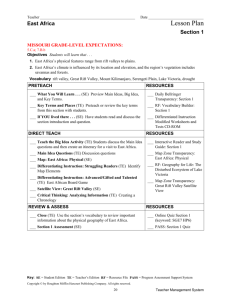
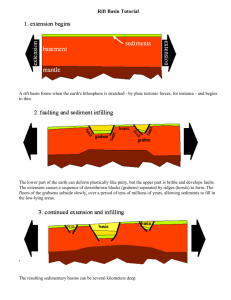
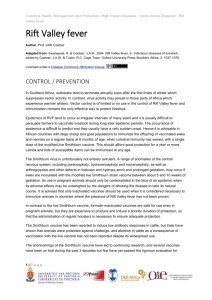
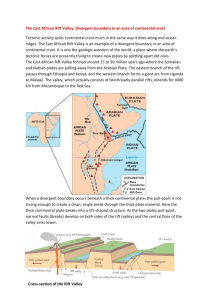


!["Human Origins in Africa" [BB09]](http://s2.studylib.net/store/data/005801692_1-b5b40078f7d5ae773e8789f2ec514d2f-300x300.png)